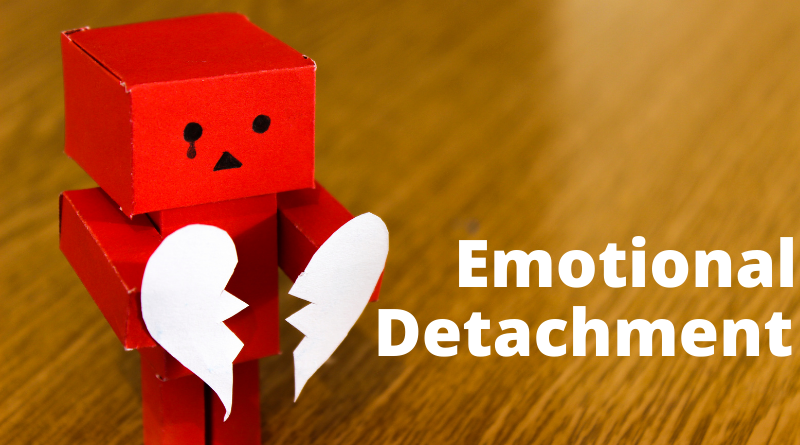Emotional detachment, also called emotional blunting at times, plays out in two different situations. In one situation, it can be the inability to connect with other individuals on an emotional level, they are not able to engage with their emotions as well as they possibly coulddid. In another, it can also be perceived as a coping mechanism for individuals dealing with anxiety. People dealing with anxiety or a lot of stress in their lives may often start avoiding certain circumstances which they know will trigger their anxiety, this coping mechanism is also called emotion focused coping. While this may help and protect the individuals it also causes a lot of psychosocial problems for that person.
Emotional detachment may not often be explicitly seen in an individual’s behaviours, at least not cause as altering behavioural changes that some conditions do. Although Patients identified with emotional detachment face challenges in forming meaningful emotional interpersonal relationships with others, they face difficulties in empathising and expressing and identifying their emotions. Another factor involving difficulties in making and maintaining interpersonal relationships is that often people with anxiety or stress disorders face this challenge.
The person may usually seem like they are elsewhere and not entirely “present” with you or they might be present with you but give away a pure intellectual behaviour when emotional responses would be appropriate. These individuals may avoid situations which are intensely emotional or avoid places or people associated with emotional traumas. This severe dissociation of theirs can cause such people to forget important moments because their mind blocks it for them, in severe cases this can also lead to amnesia. Oftentimes the temperament of not being able to empathise with others has in quite some cases been related to the Narcissistic Personality Disorder.
Symptoms of emotional detachment:
It can show up with different symptoms in both children and adults. In children it can show up as two different types of attachment disorders. They are:
-
Reactive attachment disorder:
In this way children may have negative experiences with adults when they are in their early years.
Symptoms are:
-
They cant calm down easily
-
They don’t show reaction or emotions while interacting with people
-
They are not looking for comfort from people who are their caregivers.
-
They may feel irritable, scared or feared, when they are in engagement with their caregivers even for normal activities.
-
Disinhibited social engagement disorder:
Symptoms are:
-
they are over friendly with the strangers
-
going to the strangers and hugging them
-
They are also allowing strangers to pick them up in their arms
-
They are not going to have a check with their caregivers when they are not in their right situations.
In adults it can show the signs:
-
They have a difficulty in opening up with the people
-
Their listening skills are very poor
-
They are usually challenging their personal relationships
-
Their physical, verbal and sexual contact is quite lacking
-
They are having poor self esteem
-
They are engaged in substance abuse
-
They are ambivalent in nature
What causes Emotional Detachment?
Emotional detachment can be caused by multiple factors, and they can vary depending on the person it is affecting. This blunting might often happen because of adverseand intense childhood experiences or some kind of psychological trauma in the childhood or adulthood. Childhood abuse, neglect, or trauma can play an imperative role in making a person detached. Children who grow up in abusive households often become emotionally detached to cope with the distress they experience. In contrasting cases children can also develop to be overly attached but typically emotional detachment is the common coping mechanism.
Emotional detachment can also be caused because of some mental health conditions, it can be exhibited as a symptom of a psychological condition. Conditions like Bipolar disorder, Depression, Personality and Mood disorders, Post-traumatic stress disorder. Depersonalization disorder is also a condition which exhibits this symptom, the individual in this disorder feels disassociated from their body or feelings at times, they feel as if they are watching someone else’s life from outside and not living their own.
Emotional detachment can also occur as a side effect of certain antidepressants, namelythe selective serotonin reuptake inhibitors (SSRIs). If an individual startsstart facing this as a side effect, then they should contact their therapist.
There are also situations where an individual voluntarily detaches themselves from an intense situation as a way of coping with stress, to establish boundaries too sometimes. In these situations, the person is not unable to emotionally connect but chooses the situation in which they want to react emotionally. This can as mentioned before help someone set some emotional boundaries and ultimately help the person in maintaining their well-being. This is typically a good coping method but if overused it can also turn out to be not so fruitful for the person.
If a person is faced with these symptoms, they should consult help or professional support. As the aforementioned points, these symptoms can be interpreted as responses to a temporarily acute situation, or they may be a sign of a mental health condition. The therapist will evaluate and assess the symptoms, they may look at the health history and evaluate per se. Typically for history, the therapists focus on an individual’s moods, feelings, and behaviours. They also ask whether the individual has been experiencing the symptoms recently or since some time to see how long the symptoms have lasted. If or when emotional detachment starts having negative effects, immediately seek help and there are always treatments to help you.
Read more:
10 Reasons To Visit Sex Therapist

